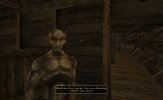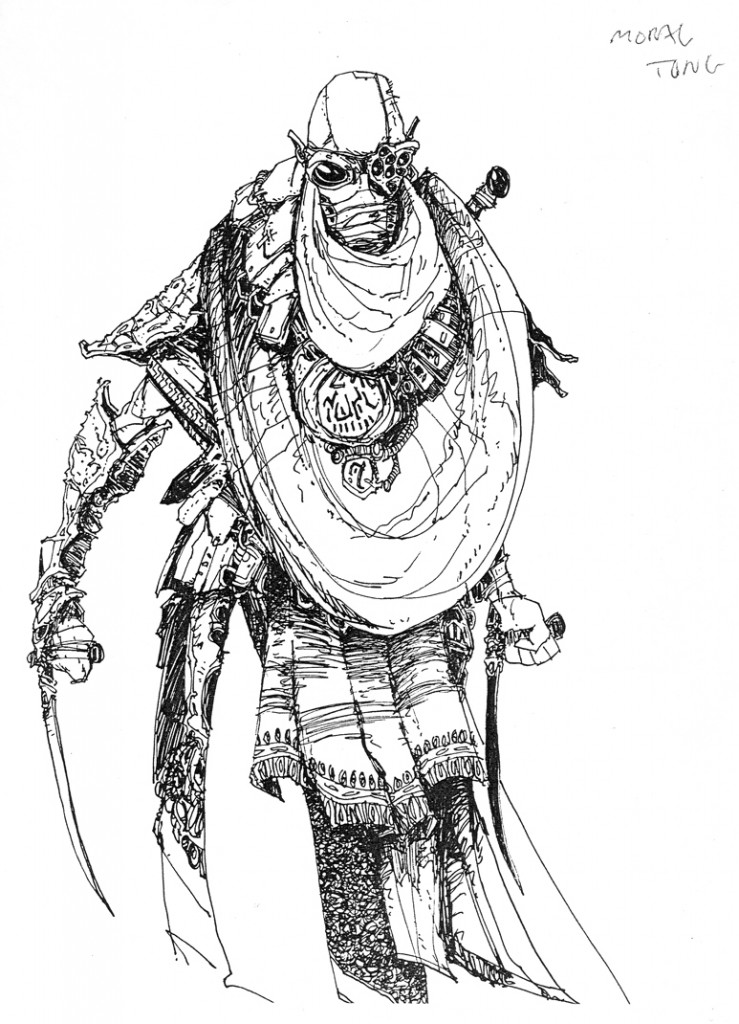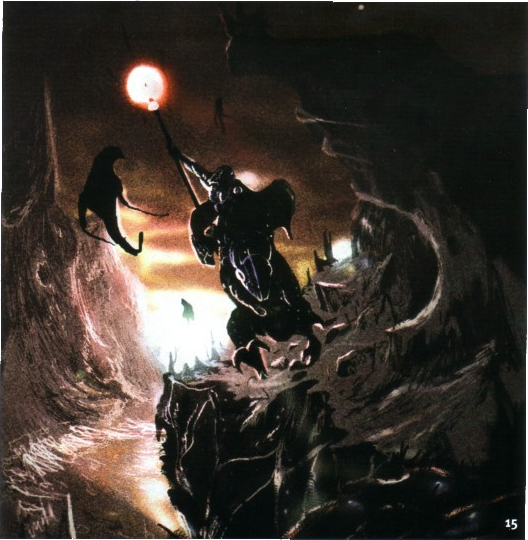I tried and bounced off Morrowind repeatedly in my teens and 20s, and then for some reason tried playing it again on xbox in my thirties and got totally hooked. I've done multiple characters/builds with different question concentrations over the course of the last few months including:
unarmored + long blade and illusion imperial warrior through the main quest and some of the fighters guild
dunmer battle mage through the house redoran quest
breton pilgrim through the temple questline
and also dabbled in being a khajjit thief + some thieves guild quests, altmer mage/atronach + some mages guild, and a few other builds. I'd still like to explore being a mage in conjuration or alchemy a bit more, but I think I have a very good feeling for what makes the game great at this point. As the thread title mentions, it is almost an addiction, where I keep playing even past the point of enjoyability.
Notably, I also tried Oblivion and Skyrim recently for a few hours and couldn't get into them, so I think something about Morrowind transcends its outdated graphics to become more timeless than Oblivion or Skyrim, without any need for nostalgia as a crutch. There is something about all the cities and towns being in the world instead of separate levels, organically built into the hillsides and rivers and islands and such, that is so much more immersive than the identical, templatized Oblivion cities. Non-voiced dialogue is I think key as well, as you can produce and, importantly, edit and revise way more written dialogue, on a lower budget, than voiced dialogue. Morrowind has sufficient flavor voice acting for greetings and such that I get the idea of different voices without the budget and player tedium of clicking through voiced lines. After a few hours of play, I appreciate being able to just wiki-like click through for the info I want without going line by line, voiceover by voiceover.
I would also actually defend the journal system, where to find old quest objectives you have to flip back through multiple pages. It feels like a real journal, and motivates you to finish one questline to the end, rather than always flitting back and forth between an infinity of trackable, quest-marker-ed and unrelated side quests. The lack of quest markers and the in-game navigation instructions by terrain features is awesome for immersion and ad-hoc exploration. Starfield represents the quintessential abandonment of this, where you simply fast travel from quest giver to quest location and back again, losing all sense of progression. I couldn't bring myself to play more than about 5 hours of Starfield, but I have played hundreds of hours in Morrowind, and that's having picked them both up in 2023. Morrowind quests aren't interesting because they tell me to go find 4 flowers. They are interesting because they tell me to go south on the road outside of Balmora, then east over the bridge and past the fort, then south along the foyada, then east again until I hit a lake etc...so that over the course of a fetch quest I learn about the world biomes, factions, navigation, sign-posts, and more. I see that there are different factions with distinct architectural and armor styles, that there are forest and riverine and swamp and lava and temparate biomes, that I can find different alchemical ingredients in different areas and that some places are more or less hostile to the player, and that I can navigate in a diagetic way, and that terrain features like valleys and rivers and dried lava flows actually go somewhere, etc... It's about the holistic, medieval fantasy world immersion experience.
I understand why they included the mudcrab and scamp merchant, but I think on the whole it harms the experience, especially on replays once you understand the mechanics better, as my early game loop tends to consist of finding a number of 500-1000 gold artifacts, plus a 10k+ daedric artifact or two, and then going to the scamp merchant and selling/resting/selling/rebuying until I have enough gold to buy all the training needed to be mid to high skill level at an early character level, and that kind of breaks things a bit. The economy of Morrowind is certainly weird, and I think daedric artifacts having prices in the tens or even hundreds of thousands was meant to communicate their pricelessness, rather than to actually represent realizable monetary gain. If you actually get 100k+ gold, which is not that hard with the magic creature merchants, then you can pretty much break the game through training (ofc alchemy is even more broken, but I noped out of my alchemy build very early because it was boring).
The incredible level of freedom is a fundamental part of the appeal. Cities aren't loaded in, and instead they are part of the world, so you can just levitate or jump across the whole map, walk on water, swim fast and breathe underwater, fly through a dungeon invisible and shoot enemies from the air to cheese any battle, craft potions of incredible stat fortification, unlock (or lock!) any door or chest, turn any undead or human or conjure any creature, etc...it's totally unbalanced, but it's a single player open world game so who cares? If you wanna fly across the map sniping every cliff racer with fireballs or AOE magic or arrows or bolts or whatever then do it. If you wanna run straight up the hill into the hardest part of the game and strut through the ghost gate at level 1 then do it. It's just an awesome level of freedom, and a great amount of complex systems you learn more about on each playthrough for so much roleplay potential.
I get that any given mechanic is basically shallow, but the multiple approaches are, for the time especially, but even for now, really pretty cool. For example, if you want to unlock a door, you can be a security/lockpicking build and lockpick it, or you can be a mage/alteration build and unlock it with magic, or you can be a mysticism build and detect key to find the key, or you can be a warrior build and just kill everyone and loot them for the key, or you can be an illusion and personality and speechcraft build and calm enemies and persuade them to get the key, or you can be anyone and just use a scroll of unhinging, etc...all of these are, mechanics-wise, just variations on pressing a button, but the roleplay, if you meet the game half-way in the theatre of the mind, is really great. With relatively low production values and dev fidelity, you can create such a wide variety of mechanics at lower cost, and I think that is how Morrowind has so much more roleplay variety than the later TES games.
The game only feels empty if you haven't engaged with it. Yes, the NPCs don't move much, and many of them have identical canned wiki replies, but if you engage with the world, explore the wilderness and dungeons, join guilds and factions, play a role, read the in-game books, talk to the NPCs with bespoke dialogue, etc...there's just so much there. So much cool backstory and video game metacommentary in the 36 lessons of Vivec, and so many great short stories in those books and environmental storytelling and bizarre characters. Like Caius Cosades is your first point of contact with the blades and he's like a weird medieval fantasy CIA agent with a drug problem who just stands shirtless in his apartment, or Crassius Curio the house Hlaalu Imperial who is like a funny perv that makes inappropriate comments and won't talk to you until you strip in front of him, or the quest where you have to dress up a slave as a fake noblewoman as a wife for a nomadic dunmer clan-chief, like it's so wacky and funny and bizarre and also real feeling for a fantasy world. It's genuinely brave and bold in a way you probably couldn't get away with now.
You can roleplay whatever you want and it still basically works because of the lack of balance (in a good way!). I did a pilgrim Breton, medium armor, archer member of the temple, and it was the worst build ever in terms of effectiveness, but a great and fun roleplay and I became the Patriarch of the temple anyway.
...Sure, you can explore. You can live out as a thief, or a mage who makes and sells potions, or an enchanter who sells enchanted items, or as a hunter who lives off the land. That's a good concept for people who don't mind the game never ends, and want to simulate a character's life in it...
I think this is basically the appeal. It's a medieval, fantasy world simulation. The world could definitely be more dynamic, like playing the role of a bandit as you mention, requiring more factions and more dialogue and maybe dynamic things like caravans you can raid, but for the time it's an awesome roleplay and simulation. The focus on a "game loop" of dungeon crawling in the later games I think lose sight of that fact.
I played a heavily modded Open-MW version of Morrowind for awhile but...on the whole I found it worse than the vanilla experience on xbox. In individual pieces, bug fixes, balances, textures, models and so on...modded Morrowind might be superior to vanilla, but there is something about the coherent original vision and art direction that just all goes together to feel right in a way that 100 mods from 100 mod authors does not. There's something about this visual style that does not need "improvement" (see attached). I also prefer the console UI.
It is true that it's a bit lame that after you get to the top of the guild or house nothing really happens, BUT, it's really the journey that matters. As in, literally the exploration across the map, as well as moving up the faction hierarchy. Once I became Patriarch of the temple I just started a new build as a dunmer in house redoran etc...you really have to meet Morrowind half way and indulge in the roleplay. The world doesn't react very much to your actions, so it's more about engaging with it as it is and living there, not resolving some civil war or whatever. That is, the illusion does falter at a high character level, but at that point it's time to start over or do the expansions anyway.
There's not a lot of roleplay in the dialogue like in say FNV, that's true, as really the roleplay is in the *gameplay* ie how you finish quests. Do you sneak around and break in, kill everyone, shoot them from afar, magic them into submission, persuade them, or whatever. It's not really about making one faction beat another (although there is some of that, like thieves vs fighters guild). The faction variety lets you play the same class in some many different ways thematically. You can be a bog-standard sword and board warrior, but are you a dunmer noble warrior of the temple, or an imperial legionnaire and member of the imperial cult and agent of the empire, or are you a nordic sell-sword member of the fighters guild and traveling brawler etc...
There is very little control over combat ofc. You can click a bit more efficiently, or use speed to move in and out of attacks, or turn off always use best melee attack to directionally choose attacks yourself as the *player*, but really the combat is *roleplay* as the *character*, ie your player skill does not matter. You block if your *character* can block, not if you the player right clicked at the right time, and for a roleplay game that's how it should be. You unlock a chest if the character has the stats to roll well, not if you the player can beat a minigame, etc...
Being able to get some very good, or even the best, armor and weapons in the game by knowing where to go, or what to loot, or who to cheese kill by shooting them while standing on a rock is...well...just part of the world being immersive. It's a "real" fictional world for you to explore, not a carefully curated "gameplay" experience with a smooth difficulty curve. If you wanna shoot some weird suicidal orc to death while standing on a rock at level one and thus get some of the best medium armor and two handed long blade in the game from level 1 then, well, that's just something in the world for you to find. It feels "real" in a way that a balanced game never can.
It has the best diegetic fast travel of any game ever made and I will absolutely fight you in real life over that. There are silt striders as a kind of caravan ride between major towns in the settled South/West of the map, there are boats all around the coast, there are magic teleports between mages guilds and there are the propylon indices you can find to travel between ancient dunmer strongholds in the more hospital parts of the map, plus jumping and levitating and water walking in between, plus the scrolls/spells to transport you back to either imperial or temple shrines, plus mark/recall spells, so all very in-world while being very convenient, but not so immediate that you miss out on world exploration or getting familiar with the terrain, plus you have to really earn it. It's basically perfect, unlike most other aspects of Morrowind, and if I were to make an open world RPG I would just copy it.
The mix of fixed levels for many NPCs plus some leveling for more generic dungeons and bandits, within ranges, is a very nice balance of scaling difficulty + nice worldbuilding of many things being a fixed challenge. Way better than Oblivion.
Bribing is too easy (especially with aforementioned economy cheesing), the faction skill/attribute requirements are too low, some really good equipment is too easy to find if you look it up (but is that the game's fault or the internet's fault?), it's a bit too fast/easy to get massively OP, the factions are not exclusive enough with their benefits. The scamp/mudcrab merchants should be removed and ordinary merchants should sometimes have (much) more money, and probably should not immediately restock on closing the trade window. You should probably not be able to fortify skills/attributes beyond say 150% of normal max value. Fatigue being important for almost all types and builds interactions and combat is alright, but that combined with it always being zero from walking is not (i think they realized this at some point in dev, so they give you that ring or whatever in the main quest that restores fatigue at a consistent rate over time. I'd like the same for magicka tbh as my atronach build was quite tedious as I did not pair it with alchemy).
...I loved Morrowind simply for the feeling of exploration...You really felt like you were inhabiting a world, at least from a geographical and architectural perspective. It got the physical aspects of the game world down, better than any other game I can remember...I still remember crawling around the alien and hostile landscape when I was only level 2 or 3, watching the sun set through the mist. That's more than I can say for most games.
YAS...I think exploration might have been even better with a) a few more distinct landmarks around, b) better written instructions on some quests and c) a gothic style purchasable set of sketchy illustrated maps rather than a GPS w/auto marked map, although the latter might have made the game almost impossible for a normie.
You do have to commit a lot of murder for most quests, but I feel doing a pilgrim class Temple playthrough was as close to goody two-shoes as I was gonna get, and it was a fun and challenging roleplay.


























